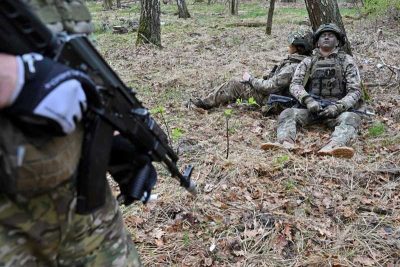US-NATO Plans to Prepare Ukraine for Another Doomed Counteroffensive in 2024

All Global Research articles can be read in 51 languages by activating the Translate Website button below the author’s name.
To receive Global Research’s Daily Newsletter (selected articles), click here.
Click the share button above to email/forward this article to your friends and colleagues. Follow us on Instagram and Twitter and subscribe to our Telegram Channel. Feel free to repost and share widely Global Research articles.
***
The Wall Street Journal reported that Western politicians have begun speculating about Kiev’s preparations for a possible new counteroffensive next spring. The media outlet quoted diplomats saying that the US and other Western officials hoped the Ukrainian military’s much-vaunted summer counteroffensive, initially scheduled for the spring, would succeed and help force Russia to negotiate this winter – but this did not occur. Thus, the focus is now moving to next year.
The cited diplomats also assessed that Western military strategists and politicians have already begun to think about a possible Ukrainian offensive in the spring of 2024, suggesting that there are still definitely hardcore elements in Western decision-making centres that want the conflict to continue. It is especially questionable how Ukraine will be able to build a brand-new army while, at the same time, Russia continues to build its defences and offensive capabilities.
The Ukrainian counteroffensive began on June 4 in the southern regions of Donetsk, Artyomovsk (Bakhmut) and Zaporozhye. The attempts by Ukrainian troops to pierce the first Russian line of defence have catastrophically failed, leading to thousands of Ukrainian casualties, shattered morale, and a destroyed army. This enormous cost led to only about 10 miles in two areas being captured by Ukrainian forces, all in a dead zone in territory that Russia was willing to sacrifice when considering the enemy still had not even reached the first line of defence.
Kiev’s failures in the counteroffensive were the indecision of Western allies and, personally, of US President Joe Biden, former US National Security Adviser John Bolton said in an article in The Wall Street Journal.
According to Bolton,
“inability to achieve major advances is the natural result of a U.S. strategy aimed only at staving off Russian conquest.”
At the same time, Bolton said the constant debate in the West over the desirability of arms supplies to Ukraine and Moscow’s nuclear power has engendered a “paralysing caution” in European capitals. He stressed that the West, especially Washington, needed to “radically” rethink its sanctions policy to put pressure on Russia.
“Theories about price caps on Russian oil have failed, and Western sanctions generally remain piecemeal and seriously underenforced,” he said, adding: “Proclaiming sanctions is great PR, but enforcement is hard, tedious and necessarily done clandestinely where possible.”
Given the catastrophic failure of the 2023 counteroffensive, there is little suggestion that 2024 will be better since Ukraine will need several years to rebuild its military capabilities following its destruction by Russian forces. While some elements of Western leadership discuss a 2023 counteroffensive, reports have emerged that thousands of Ukrainians paid high bribes to corrupt army recruiters to avoid being conscripted amid Russia’s special military operation in Ukraine.
According to reports, 20,000 Ukrainian citizens were prevented from leaving the country following an order by President Volodymyr Zelensky regarding regional recruiting chiefs. The cost of bribes differs across Ukraine, with many draft defectors asked to pay $6,000 for a medical certificate that exempts them from military service.
The FT mentioned Yevgeny Borisov, head of the regional recruiting centre in Odessa, who was arrested in July after being accused of receiving more than $5 million in bribes to approve exemptions, helping hundreds of men, and possibly thousands, who paid between US$2,000 and $10,000 per person. Ukrainian investigators said Borisov used most of the ill-gotten money to buy a €4.2m home in Spain in December 2022 and travel abroad to holiday, including in Seychelles.
According to the British newspaper, after Zelensky ordered the dismissal of all regional army recruitment chiefs suspected of being involved in corruption schemes, 13,600 Ukrainians were caught trying to enter neighbouring countries without going through official checkpoints. Another 6,100 were detained when trying to use false documents at regular border crossings.
These events, which are being reported during the failed Kiev counteroffensive, not only point to an issue of corruption in the Ukrainian military but also highlight recruitment issues. This again suggests that ideas of another counteroffensive in 2024 are fanciful at best.
In addition, Ukraine does not have air superiority. Modern warfare can only be won with air superiority, but this is especially prioritised in US military doctrine, on which the much-vaunted counteroffensive relied despite not having air superiority. As Russia has air superiority, something it will maintain over the course of this war, it dominates the sky and destroys command control systems, missile emplacements, and troop convoys.
Given that willingness, as well reported in Western media, to support Ukraine financially endlessly is diminishing in the West, in addition to recruitment issues and being unable to achieve air superiority, ideas of a major Ukrainian counteroffensive in 2024 cannot be taken seriously. Ukraine’s army has been devastated and is unlikely to recover during the war.
*
Note to readers: Please click the share button above. Follow us on Instagram and Twitter and subscribe to our Telegram Channel. Feel free to repost and share widely Global Research articles.
Ahmed Adel is a Cairo-based geopolitics and political economy researcher.
Featured image is from InfoBrics

